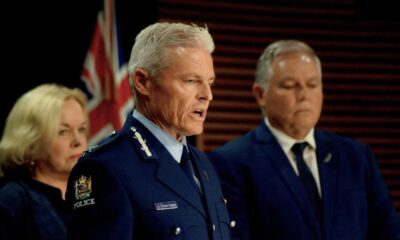Politics
Swarbrick Challenges National MPs on Gaza Stance and Sanctions

Chloë Swarbrick, co-leader of the Greens Party in New Zealand, publicly criticized members of the National Party over their hesitance to adopt a stronger position regarding sanctions against Israel in light of the ongoing conflict in Gaza. During recent discussions, Swarbrick revealed that several National MPs expressed a desire to support tougher measures but feared repercussions from their party leadership.
The remarks came as tensions escalate in the region, with significant humanitarian concerns emerging from the conflict. Swarbrick pointed out that while there is a growing call for action among the public and some political circles, National MPs are seemingly constrained by party loyalty and fear of internal backlash.
Calls for Action Amid Rising Concerns
According to Swarbrick, many National MPs privately acknowledge the need for a more assertive response to Israel’s actions. She stated, “What the hell is the point of your job?” highlighting the frustration regarding the lack of decisive political action. Her comments underscore a broader debate within New Zealand’s political landscape about the role of elected officials in addressing international issues and moral responsibilities.
The conflict in Gaza has drawn widespread condemnation from various groups, including human rights organizations. With the situation dire and civilian casualties rising, Swarbrick’s call for stronger sanctions echoes sentiments shared by many advocacy groups across the nation.
In recent weeks, protests demanding a more substantial response from the New Zealand government have taken place, reflecting public discontent with perceived inaction. Swarbrick’s challenge to National MPs could signify a crucial moment in New Zealand’s political discourse regarding foreign policy and humanitarian intervention.
Political Consequences and Future Implications
The National Party’s leadership has not publicly responded to Swarbrick’s allegations, leaving questions about the party’s stance on international humanitarian issues. Political analysts suggest that if National MPs remain silent or unwilling to take a stand, they may face backlash from constituents who expect their leaders to advocate for human rights and justice.
As the conflict continues to develop, the pressure on New Zealand politicians to articulate clear positions is likely to intensify. Swarbrick’s statements may encourage more open discussions within the National Party and prompt other political leaders to reassess their approaches to foreign policy.
The situation in Gaza remains fluid, and the implications of New Zealand’s political responses are significant. With the international community closely observing actions taken by governments worldwide, New Zealand’s stance could affect its diplomatic relationships and influence regional policy discussions.
In conclusion, Chloë Swarbrick’s recent comments have sparked a vital conversation about the responsibilities of elected officials in addressing complex international crises. As discussions within the National Party unfold, the outcome may shape New Zealand’s future political landscape and its response to global humanitarian issues.
-

 World1 week ago
World1 week agoPrivate Funeral Held for Dean Field and His Three Children
-

 Top Stories2 weeks ago
Top Stories2 weeks agoFuneral Planned for Field Siblings After Tragic House Fire
-

 Sports3 months ago
Sports3 months agoNetball New Zealand Stands Down Dame Noeline Taurua for Series
-

 Entertainment3 months ago
Entertainment3 months agoTributes Pour In for Lachlan Rofe, Reality Star, Dead at 47
-

 Entertainment2 months ago
Entertainment2 months agoNew ‘Maverick’ Chaser Joins Beat the Chasers Season Finale
-

 Sports3 months ago
Sports3 months agoSilver Ferns Legend Laura Langman Criticizes Team’s Attitude
-

 Sports1 month ago
Sports1 month agoEli Katoa Rushed to Hospital After Sideline Incident During Match
-

 World2 weeks ago
World2 weeks agoInvestigation Underway in Tragic Sanson House Fire Involving Family
-

 Politics2 months ago
Politics2 months agoNetball NZ Calls for Respect Amid Dame Taurua’s Standoff
-

 Top Stories2 weeks ago
Top Stories2 weeks agoShock and Grief Follow Tragic Family Deaths in New Zealand
-

 Entertainment3 months ago
Entertainment3 months agoKhloe Kardashian Embraces Innovative Stem Cell Therapy in Mexico
-

 World4 months ago
World4 months agoPolice Arrest Multiple Individuals During Funeral for Zain Taikato-Fox



















